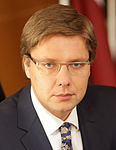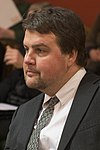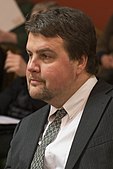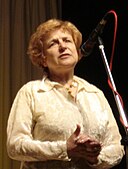- Valdis Dombrovskis (JV)
- Sandra Kalniete (JV)
- Nils Ušakovs (S)
- Andris Ameriks (S)
- Roberts Zīle (NA)
- Dace Melbārde (NA)
- Ivars Ijabs (AP!)
- Tatjana Ždanoka (LKS)
| ||||||||||||||||||||||||||||||||||||||||||||||||||||||||||||||||||||||||||||||||||
All 8 Latvian seats in the European Parliament | ||||||||||||||||||||||||||||||||||||||||||||||||||||||||||||||||||||||||||||||||||
|---|---|---|---|---|---|---|---|---|---|---|---|---|---|---|---|---|---|---|---|---|---|---|---|---|---|---|---|---|---|---|---|---|---|---|---|---|---|---|---|---|---|---|---|---|---|---|---|---|---|---|---|---|---|---|---|---|---|---|---|---|---|---|---|---|---|---|---|---|---|---|---|---|---|---|---|---|---|---|---|---|---|---|
| ||||||||||||||||||||||||||||||||||||||||||||||||||||||||||||||||||||||||||||||||||
An election of the delegation from Latvia to the European Parliament was held on 25 May 2019. [1] The previous elections were held in 2014.
Contents
The election uses the Sainte-Laguë method, which is weighted against the larger parties. That explains why, according to the results of one opinion poll, parties with 6% of the vote would be allocated one seat each, while a party with 17% of the vote would also be allocated only one seat.













